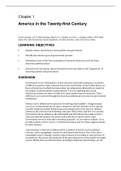THEME 1
Primary Relationship:
A relationship that exists to the extent that two people exert strong, frequent, and diverse effects on
one another over an extended period of time
There are many different definitions of what a primary relationship is, however, there are always
three things in common
- Interdependence
- Need fulfilment
- Emotional attachment
Lifespan perspective
Relationships change over time. While the relationship with your parents is given from the moment
of birth onwards, friendships develop later in life as well as romantic interests.
Friendship -> early childhood
Romantic relationships -> late childhood, early adolescence
Birth Death
Family
Friends
Romances
How do they affect each other?
Health and well-being
Social relationships are important for one’s mental and physical well-being
If social relationships of less quality:
Die early
More illnesses (such as cancer, cardiovascular diseases)
Health conditions (like high blood pressure)
Poor immune system, slower healing
,Development of Primary Relationships Lecture Summary
Most research has been done on marriage as that is easiest
Comparing married to non-married people:
Marriage is associated with health advantages (if not been married before)
People who remarry show better health than people who stay single after a divorce
Length of marriage doesn’t make a difference
Divorce and then remarrying doesn’t seem to make a difference in the health
However, is this true for all marriages?
Likely not, as it’s average affects and therefore not true for everyone. If you’re in an
unhealthy/unhappy marriage, it’s associated with lower health, you might even be unhappier in the
marriage than if you were a single. Also, happy marriage can lead to lower health too. For instance, if
you must care for your partner over a longer period of time.
Past vs. Present
Past Present
from 70s recent
men benefit more (health men more externalising (alcohol)
increases) women more internalising
women more likely to be (depression)
depressed generally, marriage has benefits
possibly as marriage used to be but if it does turn bad, both
less equal (women care for their parties suffer consequences,
partner, more submissive) however, the way those are
generally, marriage is still more presented differ
beneficial but if it turns bad,
women suffer more
Research has changed a lot over the years and findings differ
Explanations
Two theories have been proposed to explain this negative effect of divorce on our mental health:
Social Selection Hypothesis Social Causation Hypothesis
Mental health problems cause the Marriage breakdown causes the
marriage breakdown mental health problems
Vs.
Both are likely true as evidence shows that before a divorce there is often already indications for
mental health problems (social selection hypothesis) but for instance when losing your partner, this
can lead to mental health problems afterwards (social causation hypothesis).
,Development of Primary Relationships Lecture Summary
What about new relationships and mental health?
The mental health discussion is not only valid for romantic relationships but also family and friends.
Studies by Howell et al. (2014) during a summer school where people who didn’t know each other
came together:
The more central in the
network
Happier, less stress More illnesses, more risk
-> mental health behaviour
improved -> physical health declined
Primary relationships are thus important for health but in search of social status and acceptance
there can be more risk behaviour
The decreased physical health is mainly due to the strategies used to become popular
Determinants of relationships
What decides with whom we become friends and form relationships and how long these last?
Proximity
Possibly the most important factor
- Physical distance (eg in classroom, people seated closer to each other more likely to form
friendships)
- Functional distance (eg in student housing physical distance is the same but those having a
room closer to the bathroom, kitchen etc. are seen as more popular as you just meet them
more often; amount of interactions)
- True for youth and elderly (eg in elderly homes the same concepts go with ppl closer to
elevators etc more popular)
- True for friendships and romantic love
- True for quality of relationships
- However, proximity is also the most important factor for making enemies, eg hating a
neighbour
- Proximity is still very important, especially in forming new relationships as it isn’t as
important for maintaining them anymore (because social media exists)
, Development of Primary Relationships Lecture Summary
Similarity
- How similar are you? “Birds of a feather flock together”
- Friends/partners similar in:
o Demographics
o Attitudes and values
o Personality
o Popularity
o Physical attraction: Matching hypothesis
o Antisocial behaviour and depression
- True for both partners and friends
- Similarity goes for matching with people who are similar in both positive and negative
characteristics
Complementarity
- Opposites attract
- However, little support of this idea
o Only seems to be true in a case of dominance/submission
- Similarity is more important than complementarity!
Attractiveness
Physical Attraction
- Beauty facilitates social life; we want to hang out with people who we see as beautiful and
also:
- Halo effect: “What is beautiful is good”; people who are seen as beautiful are associated with
more positive personality characteristics as well
- Attractive children/adults are judged and treated more positively than unattractive
counterparts, this kind of plays into the whole Halo effect
- However, people who are seen as extremely beautiful/attractive often have fewer same-sex
friends and are seen as self-centred and other negative characteristics; they don’t seem
relatable unless we see them for instance trip, fall etc which makes us see them as more
positive
- Generally, attraction is a good determent of forming relationships
Reciprocal Liking
(Liking back and forth)
- we like people who express liking for us (reciprocity effect)
- Self-fulfilling prophecy -> transforming a belief into actual reality, so they start liking you:
because you believed that they like you more you change your behaviour towards them, and
it makes them actually like you more due to your behaviour. Thus, if you think that
somebody likes you, you will start treating them differently, eg you are more agreeable, pay






